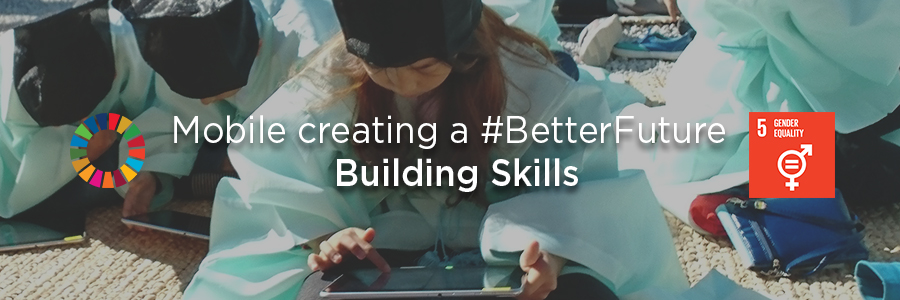
It is crucial we ensure women have the skills and confidence to reap the benefits of mobile technology and are equipped with more advanced digital skills to enable them to participate equally in ICT related industries.
A lack of literacy and digital skills is the main barrier to mobile internet use among mobile users who are aware of it. It is the greatest barrier for women in Africa and for both men and women in Asia. Low literacy levels are a key factor in several markets. For example, in Nigeria, 27 per cent of women and 22 per cent of men who are aware of, but do not use the internet, cite literacy as the most important barrier. A lack of digital skills and confidence also prevents many women from owning a mobile phone in the first place.
If women lack the skills and confidence to use mobile handsets and services including mobile internet, women risk missing out on the benefits of connectivity and will be left behind as societies and economies digitise.
Mobile operators and other stakeholders are investing in public education and digital skills initiatives for women and girls, and ensuring handsets, mobile apps and operating systems are user friendly for the less literate.
Addressing women’s lower digital literacy and skills, including advanced skills, will help address the gender gap in mobile access and use across low- and middle-income countries, enhance women’s representation in ICT related industries, and allow equal participation in the digital economy. This will bring benefits not only to individual women and their families but also to society and the economy as a whole, while also contributing to the achievement of the UN Sustainable Development Goals.
When women thrive, societies, businesses and economies thrive.

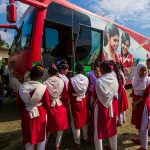
Digital training bus
Digital Training Bus, Bangladesh
The Digital Training bus is a Bangladesh government initiative, supported by Huawei and Robi Axiata, which travels around rural areas giving women and girls the chance to learn basic digital skills. As of December 2019, over 63,000 girls and women had received training through the Digital Bus Program, with a goal of reaching another 166,000 by 2022.
Resources
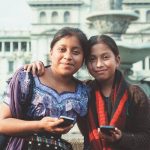
Technology workshops
Mujeres Conectadas, Guatemala
Tigo Guatemala has partnered with SHEVA, an organisation dedicated to empowering women through technology, to launch Mujeres Conectadas. Using workshops, this programme aims to empower girls and women aged 15-40 by equipping them with the skills and knowledge to use mobile technology. This includes staying safe online and avoiding harassment, promoting their businesses on social media, and digitally managing their finances. To date, Mujeres Conectadas has trained more than 31,000 Guatemalan girls and women.
Resources

Increasing literacy
Knowledge Is Power, Egypt
The Vodafone Egypt Foundation’s ‘Knowledge is Power’ programme aims to increase adult literacy, with a particular focus on teaching women to read and write. Using a free Vodafone literacy app on either a smartphone or basic feature phone, women are able to learn at home and in their own time. The app uses pictures and a talkback function. The user simply taps a letter and is then told how to pronounce it via audio functionality. The app is used in conjunction with local classroom sessions, with a final exam provided by the General Authority for Literacy and Adult Education. Over 480,000 illiterate adults have enrolled in classes, and approximately 70 per cent of graduates are women.
Resources

Improving digital literacy
The Digital Ambassadors Program, Rwanda
The Digital Ambassadors Program (DAP) is a scheme led by MITEC in partnership with Digital Opportunity Trust and supported by EQUALS which aims to improve digital literacy in Rwanda, with a special emphasis on empowering women. The program has impacted 41,307 citizens to date, approximately half of which are women.
Over three years, DAP aims to mobilise 5,000 young leaders to transform the lives of two million citizens through digital skills and adoption of e-services, driving inclusion and growth.
Resources

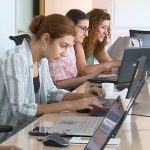
Creating new developers
Women Developers of the Future
Thanks to Women Developers of the Future, since 2017 more than 770 women have been trained in 18 cities, writing 2.3 million lines of code. Over 200 mobile apps have been developed and launched by more than 300 women and hundreds of women have found career and internship opportunities in the mobile industry. With the support of the Turkish Government, the project has a future goal of reaching a million women in the country.
Resources
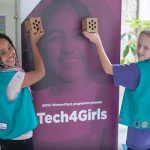
Supporting girls in STEM
GSMA Tech4Girls Partnership with Girl Scouts of Greater Atlanta
GSMA North America announced a partnership with the Girl Scouts of Greater Atlanta designed to help reduce the gender gap representation in science, technology, engineering, arts and design and math industries. Themed “Girl, Find Your Voice,” the partnership will offer Girl Scouts of Greater Atlanta members four Tech4Girls hands-on workshops between 2019 and 2020.
Resources

Teaching girls to code
Vodafone helps girls to #CodeLikeAGirl and advance in STEM
Vodafone’s Global Code Like a Girl programme was launched in 2017 in partnership with Code First: Girls, which has continued to grow over the years and has reached more than 3,500 girls in 23 markets to date.
Resources
The GSMA works with mobile operators in collaboration with partners and international organisations on initiatives to close the gender gap globally. To get involved contact us by emailing [email protected]